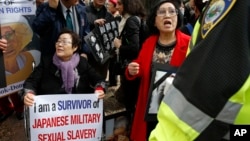Japanese Prime Minister Shinzo Abe is in the United States. He plans to visit four U.S. cities and meet with President Barack Obama at the White House. On Wednesday, he will speak to a joint meeting of the Senate and House of Representatives.
Mr. Abe’s visit comes as the security and economic relationship between the two countries is changing. U.S. and Japanese officials recently amended defense guidelines to give Japan more responsibility for its own defense. This is the first time those rules have been changed since 1997.
Evan Madeiros is Senior Director for Asian Affairs at the U.S. National Security Council. He says the new defense guidelines will expand Japan’s position in the alliance. He says they also will create a way for Japan to provide additional support to the U.S. armed forces.
Kenichiro Sasae is the Japanese ambassador to the United States. He spoke recently at the Centers for Strategic and International Studies in Washington. He said the new guidelines will be followed by security legislation. Last year, Mr. Abe and his cabinet changed the official interpretation, or understanding, of Japan’s constitution. The Cabinet agreed that Japan can defend itself militarily.
“For Japan, this change in our thinking on collective defense is a sea-change. It is coming after 70 years of trust, and the legislation will establish a framework for Japan to further collaborate with the United States.”
Jeffrey Kingston is a professor of Asian studies at Temple University. He works at the university’s campus in Tokyo. He says the changes in Japan’s security policy are a result of China’s growing military strength.
“Back in 1997, China’s defense budget was $10 billion. Last year, it was $144 billion and there’s been a lot of saber-rattling over disputed territories between the two countries. So, the rising China narrative and concerns about its hegemonic ambitions in Asia are pushing the United States and Japan closer. And Abe is keen to secure a U.S. commitment to back it in the event of some contingency over the disputed islands in the East China Sea.”
Professor Kingston says few Japanese agree with the decision to change Japan’s security policy. He says only 23 percent of the public supports a change, while 68 percent oppose it.
Protests by Korean-Americans are expected during Mr. Abe’s visit to the United States. They are angry that Japanese troops forced Korean women to become sexual slaves during World War II.
I’m Christopher Jones-Cruise.
Victor Beattie reported this story from Washington. Christopher Jones-Cruise wrote it for VOA Learning English. George Grow was the editor.
_______________________________________________________________
Words in This Story
sea change – n. a big and sudden change
framework – n. the basic structure of something
collaborate – v. to work with another person or group in order to achieve or do something
saber-rattling – n. actions and statements that are meant to frighten or threaten an enemy by suggesting the possible use of force
hegemonic – adj. ruling or dominant in a political or social context
keen – adj. feeling a strong and impatient desire to do something
Do you believe Japan should take a greater role in its own defense? We want to hear from you. Write to us in the comments section.






